South Pole, &c.
(Not So)
Current Conditions [U]
2011-02-01 23:50 UTC
Weather: Condition 3| Temp: | −29°C |
|---|
| Wind†: | NE @ 7 knots |
|---|
| W'chill: | −38°C
(1920 W/m2) |
|---|
| Pressure: | 68.58 kPa
(10,400') |
|---|
| Vis: | 8000 m |
|---|
| Sky: | Mostly Cloudy |
|---|
Light snow grains
Mist |
|---|
†: directions are in Grid co-ordinates
Past Weather |
|---|
I'm back in Antarctica, this time at the South Pole, working on a
telescope called Keck. Note
to self: um, maybe write something more here?
Note: clicking on the images in the posts below will take you to the
picture gallery for that entry. Clicking on an image in the gallery will
take you to a full size version of that image. You're welcome to email
me, if you have questions (my email address is at the bottom of the page),
but I can't guarantee that I'll have time to answer everything, so apologies
in advance. Veteran watchers of this journal will notice that I've switched
the order of the posts, so the oldest one comes first. If you want the old
way, you can change it with the "newest first" link below. Various systems
of units are available for the meteorological data shown at right. Click on
the [U] to cycle through them until you find one you like. And don't
forget to check out the panoramas page from time to time. Panoramas are
usually added a day or two later, when I get the time to stitch them
together.
[ bottom | oldest first | RSS | panoramas | Robert's blog ]
Wed 2011-02-23 01:38:20 UTC
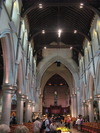
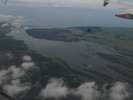
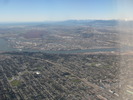
I'm back in Vancouver. This trip seems to have been bracketed by earthquakes.
First the Boxing Day Earthquake the day before I arrived, and now this one.
It's distressing to see the destruction in the city just three days after I was
there. I even went to the Cathedral, and looked at some of the flowers which
where there for the Flower Festival.
The Christchurch to Canada journey was low-grade unpleasant, as it usually
is, and completely uneventful. Due to long lay overs in Aukland and LAX, I
spent about 28 hours in transit. That's even after I managed to knock seven
hours off my intended trip by catching an earlier flight to Vancouver from LAX.
TTFN.
Thu 2011-02-17 21:19:47 UTC
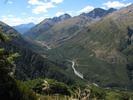
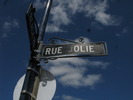
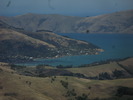
It's Friday morning. After 3214 kilometres, I'm back where I started at the
Windsor in Christchurch. Early Wednesday morning, after stocking up on
victuals, I left Hokitika and made the short drive up to Arthur's Pass. I
arrived around noon and managed to finagle myself into the last available room
in the village. That sorted, I went off and climbed up Avalanche Peak. Although
I started too late in the day to have time to make it all the way to the top, it
was still a very enjoyable tramp, unsurprisingly, largely vertical.
On Thursday morning, I hit the road again, turning eastward and back onto the
Canterbury Plain. I bypassed Christchurch and headed out to Akaroa, where I had
a pleasant lunch at the harbourfront. I spent a bit of time wandering around
the town, but couldn't take too long because I was due to return the car that
afternoon. Instead I hopped back in the car and took the scenic route back to
the highway (along the winding Summit Road). Back in Christchurch, I briefly
stopped off at the hotel to drop my stuff off then went and returned the car.
Today is mostly about repacking my stuff for the trip back to Canada. My
flight to Aukland leaves tomorrow morning.
Tue 2011-02-15 08:46:07 UTC
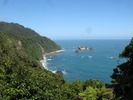
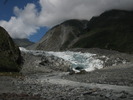
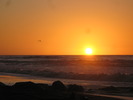
It's Tuesday evening. I'm in Hokitika. I left Queenstown early in the morning
and spent most of the day driving, finding some mountain roads with nice
scenery. I stopped in tiny little Haast for lunch. I also stopped and walked
up to the Fox Glacier. I forgot to stop in Franz Josef, so didn't see that one.
I got to Hokitika around six and found a cheap room downtown, right near the
beach. I spent the evening wandering around Hokitika and watching the sun set
over the Tasman Sea.
Mon 2011-02-14 09:49:45 UTC
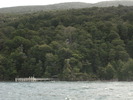
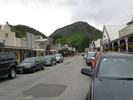
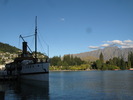
It's Monday evening. I'm in Queenstown, the adrenaline capital of New Zealand.
On Saturday it rained as the Met Service had predicted, so my decision to go to
Milford Friday was probably the right one. Instead, I joined a tour and took a
boat trip across Lake Te Anau to visit the Aurora Caves (in Maori, Te Ana-au, which means something completely different; also, I'm not quite sure what's going on with the extra A). There we did some subterranian punting to visit the local
glowworm population, who didn't disapoint. As with the blue penguins in Oamaru,
no photography allowed, so you'll have to imagine it for yourselves.
(Ironically, the glowworms don't like bright light.)
On Sunday morning I made the short jaunt over to Queenstown, the tourist
capital of New Zealand. It's all about extreme-ness: bungy jumping, jetboating,
et cetera. In the afternoon I explored the area, driving up to Glenorchy, a
town at the far end of the lake, and also checking out Arrowtown, another
gold-rush era town, which hasn't seen the crazy tourist explosion that
Queenstown has.
Today I spent some time driving someone else's Land Rover all over the place,
which was quite enjoyable. But my time here is getting short, so I'll have to
cut the craziness short; tomorrow the plan is to head up the west coast.
Effectively, I'm driving back to Christchurch in a fairly indirect route.
(Actually, looking at the map, the farthest I got from Christchurch was about here, on my way
to Te Anau, so I guess I've been on a fairly indirect route back to Christchurch
for a few days already.)
Fri 2011-02-11 10:59:59 UTC
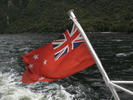
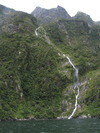
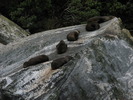
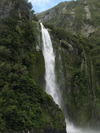
It's midnight, Friday night. I'm in Te Anau. The town of Te Anau is the base
of operations for people heading to Milford Sound, a spectacular fiord in the
Fiordland National Park (and the only one you can get to without some serious
logicstical rigmarole).
My plan was to spend two nights here, giving the intervening day (Saturday)
over to vising the Sound. Accordingly, I left Invercargill early in this
morning. Instead of the standard Invercargill—Te Anau route which goes
through Winton and Lumsden, I elected to continue following the Southern Scenic"
route which had served me well through the Catlins the day before. This route
heads west from Invercargill along the coast to Tuatapere, where the highway end
and the route reverts to secondary roads (which typically aren't much worse than
the primary routes).
It was a nice drive, suitably scenic. I misjudged the travel time somewhat.
I had told my accomodation in Te Anau that I would be there around five in the
afternoon. This was a gross overestimation of the time it took to get there.
(I keep doing this; I think it comes from growing up in Western Canada where
things are verrry far apart). In anycase, I arrived in Te Anau just before
noon. That gave me a new problem: what to do with the rest of the day?
I went to my motel to check in, which went fine, except that they weren't
done servicing the room. No problem, I said, and went off to kill an hour by
having lunch in town. Back at reception: still not ready. No problem, I said,
and went off to kill eight more hours by buying a ticket on a Milford Sound
cruise, driving out there, and et cetera.
I bought my ticket in town around quarter after one where they told me that
I'd have just enough time to drive to Milford Sound for their four o'clock tour.
It's only 121 km from Te Anau to Milford Sound according to my map, but the
stated driving time is a little over two hours. (Indeed: about fifteen minutes
out of town there's a distance sign that even points out that you're two hours
away from Milford Sound. I did stop to fill up the car before setting off
(there's no fuel at Milford).
I got to Milford Sound ahead of schedule, so had some time to look around
before my cruise. Unfortunately there isn't a whole lot to see in the
settlement, as all there is there is one hotel and the cruise ship terminal.
The cruise itself was quite entertaining. It was one of the last tours of the
day, so it was lightly attended, which was nice. (The general advice is to
avoid tours around noon, when all the tour busses show up.) Seals were seen.
Waterfalls were driven under. Far too many pictures were taken. (Don't worry:
I've already deleted about two-thirds of them.)
After the tour, I made good time back to Te Anau where finally I checked into
my room. That sorted, I headed back into town to hunt for some dinner. I found
that was no problem either: unlike all the other little towns I've been to, Te
Anau seems to have something of a night life. I had a exquisite meal at the
Redcliff Cafe, and have spent the last few hours doing the aforementioned
picture deleting. So, a good day, but one that leaves me with a conundrum: what
to do with tomorrow. After two days of good, entertaining driving, I'll welcome
the chance to take some extra rest, but hopefully sleeping in won't fill the
entire day...
Thu 2011-02-10 11:10:00 UTC
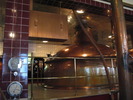
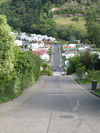
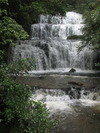
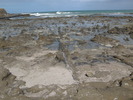
It's Thursday night. I'm in Invercargill. Wednesday afternoon I had a tour of
the Speight's Brewery, which was just down the hill from my hotel. Our tour
guide was the descendant of one of the founders of the brewery, and gave us a
very interesting tour.
This morning, I got back on the road, but not before first walking up Baldwin
Street, the steepest street in the world. That taken care of, I took a short
drive out on the Otago Peninsula, discovering a very entertaining road
(Highcliff Road) which took me to Portobello, where I stretched my legs briefly
before heading back to Dunedin by the coastal route. I spent the rest of the
afternoon exploring the Catlins, between Dunedin and Invercargill, and managed
to find some more interesting roads, not all of which were paved.
In addition I also saw the remains of a large petrified forest (Curio Bay),
and Niagara Falls. Yes, they have them in New Zealand as well, and yes,
they're just as impressive. The picture above isn't them. (That's another
falls in the area called Purakaunui.) I did take some pictures around Niagara
Falls, but I'll let you find them yourself in the gallery. I also accidently
came across a sea lion (after being told there's no way I'd see them at that
time.)
I ended up in Invercargill around seven and checked into a random motel along
the highway. Everyone I asked told me the best thing to do in Invercargill is
to get in your car and drive to Bluff, the port about 27 km south of the city.
So, that's what I did, meandering around there until it got dark and I headed
back here. Tomorrow I'll try for Milford Sound, although I may have missed my
opportunity for good photographs: another gale is forcasted to hit the island
over the weekend. We'll see how it goes.
Tue 2011-02-08 22:12:47 UTC
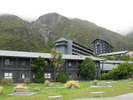
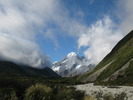
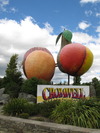
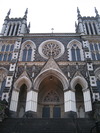
It's Wednesday morning. I'm in Dunedin. The Mount John tour was a success.
Due to some potentially iffy weather, I was able to get myself on the earlier
tour. After offering me a USAP red parka to keep warm (which I politely
declined), they drove us back up the mountain and then took us on a tour of both
the southern skies and the MOA telescope. The weather was mostly clear, with
the occasional bank of cloud moving through. The problem, though was the winds,
which were approximately 70 km/h when we first got there and had risen to about
90 km/h by the time we left. Nevertheless, a successful trip.
The following rainy morning, I left Tekapo and headed up to Mount Cook.
Despite the rain that morning, I was ensured by the Met Service that things
would clear in the afternoon. After some lunch in the town of Twizel, I made it
to the Mount Cook village around two.
The place was very full; perhaps others had heard of the impending fine
weather, too, and had the same idea I had. I did manage to find a room at the
sprawing Hermitage. My room was reasonably priced because I had no view of
Mount Cook (although that turned out to be not quite the case). Nevertheless,
with accommodation sorted, I put on my boots to do a bit of tramping about.
By the time I had arrived at the village the rain had stopped but there were
still low, ominous clouds. Consulting the i-Site (tourist centre), I found a
track I could tramp out and back before it got dark and set off (the Hooker
Valley Track).
What I hadn't anticipated was that the rain for the past few days had left a
lot of water all around that really wanted to leave the valley. My tramp
required me to ford a few streams here and there. In places, too, the water had
decided that the track was the easiest route downhill, so some track forging was
also required. It was a good amount of fun, but did delay me sufficiently that
I didn't make it out to the end of the track before I had to turn back.
Nevertheless, as I contemplated things at the far point of my journey, the
clouds opened up, giving me a great view of Mount Cook and the other peaks in
the area.
On the way back to the Hermitage I managed to get my feet very wet with one
poorly chosen fording. But, I got back around nine thirty, just as most of the
eateries were closing for the night. It wasn't a problem, though, as I had
packed food with me. I had a very pleasant and relaxing dinner under the stars
on my balcony. The hotel staff even helped me dry out my boots.
The next morning, Tuesday, I checked out of my Hotel and hit the road again.
I needed to get back to civilisation for a day or two, so decided to head back
to the coast, to Dunedin. I stopped for lunch in Cromwell, and shortly
thereafter it started raining again, quite heavily by the time I'd made it back
to the coast. I'm here for a couple of days, at a guesthouse which used to be
the residence of the local catholic Bishop. I need to run a few errands, but
hopefully this afternoon I'll have a chance to do some more touristy things.
Sun 2011-02-06 09:00:08 UTC
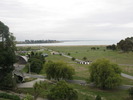
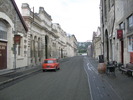
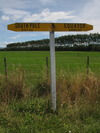
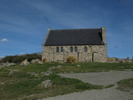
It's Sunday evening. I'm at Lake Tekapo. George Carlin had a bit about "stuff"
where he talked about how when you go travelling you end up leaving little piles
of your stuff here and there (because having a place for your stuff makes you
feel good). I've been doing that: in addition to all the piles of stuff I have
back in North America, now I have stuff at the CDC, stuff at the Windsor, stuff
in the boot of my car (parked down the road), and stuff in my hotel room here.
It works for me.
Anyways, back to the narrative: immediately after breakfast Saturday morning,
I obtained the rental car and hit the road. My rental car is Corolla painted
some sort of blue (let's call it "sky"). Since obtaining my car, I've notice
that about one in three Corollas on the road are painted the exact same
ridiculous shade of blue. I can only assume there was some mix up somehwere
which resulted in an entire ship of blue Corollas being sent down here.
Anyways, back to the narrative: I followed my musings in the last post and
headed south from Christchurch, ending up in Timaru for lunch, about two hours
south. I spent a few hours in the city, including wandering through the local
art gallery (Aigentighe). Showers started, and I decided to get back on the
road, ending up in Oamaru. I stayed the night here at the Victorianesque
Criterion Hotel. It's sufficiently old-school that checking in involves talking
to the barkeep of the pub downstairs.
With the room sorted, I headed over to the information booth to learn about
penguins. This, in turn, led me to Bushy Beach, where I managed to see one of
the rarest penguins, the yellow-eyed. I even took some pictures. I didn't stay
too long though, because I was getting wet. After dinner, around nightfall, I
headed around the bay from my hotel to the blue penguin colony, where I sat in
the grandstand where we watched the blue penguins (the smallest penguin species)
come in from a long day of swiming and eating fish. I found it very
entertaining. No pictures, though, because the NZ Department of Conservation
prohibits it. (Flashes tend to make the penguins go blind, and they don't want
to risk people thinking they know how to turn their flashes off.) The tally
of returning blue penguins that night was about 193, which brings us to:
PENGUIN TALLY:
- 193 Blue Penguins (cute, small), Blue Penguin Colony, Oamaru
- 5 Emperor Penguins (big, immobile), Pegasus Road, McMurdo
- 1 Yellow-eyed Penguin (far-away, grainy), Bushy Beach, Oamaru
- 1 Adelie Penguin (dead, desicated, on a table), Scott's Endeavour Hut, Cape Evans
- Total penguins: 200.
From this I think it's safe to conclude that (a) 97% of penguins live
near Oamaru, New Zealand; (b) Adelies are indoor penguins, and may
possibly be extinct.
The morning was warm and clear. I stuck around to take a few more pictures,
and learned that a regatta was unfolding down by the water. I didn't hang
around to take it in, though. Getting back in the car, I back-tracked to Timaru
and then veered inland. I forgot to have lunch, but made it here to Lake
Tekapo, by three. Instead of stopping in town, I blew right through and headed
up nearby Mount John, where New Zeland's largest telescope resides, along with
several others. The road up to the top is quite entertaining, about one and a
half lanes wide with tight switchbacks.
Atop the mountain there's also a café with superb views of the valley, where
I had a belated lunch. While up there, I enquired about the tour they run to
see the telescopes and do some stargazing and astrophotography, and reserved
a spot for this evening. Back in town I found a room for the night and then
went to look at another of Lake Tekapo's attractions: a stone church building
(and a nearby statue of a dog). When I got to the church a joint
Presbyterian/Anglican (Presbytanglican?) service was starting, so I stayed for
that. The parish is currently in search of a new vicar, but the lay pastor
spoke on Micah 5 and Matthew 26:69-75. Now I'm waiting for the Mount John
tour to begin.
Fri 2011-02-04 05:21:05 UTC
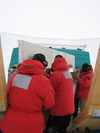
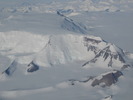
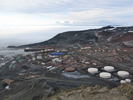
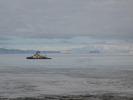
It's early Friday evening. I'm back in Christchurch and am slowly recovering.
Chin-Lin and I were scheduled to fly out on Tuesday. On Monday night we had
Bag Drag (which meant we had to hand over our checked luggage to Cargo for
palettisation. The PAX Out flight was scheduled for Tuesday around noon, and
Chin-Lin and I got all suited up to meet it, only to watch it boomerang as it
approached South Pole. It turns out, one of it's skis wouldn't deploy, so it
had to go all the way back to McMurdo where it could land using only wheels.
That was kind of unfortunate, but Pole COMMS were able to quickly reschedule us
(and the other 13 or so people who were leaving) onto another LC-130 which was
coming in at two that afternoon.
This one landed without a hitch and were were on our way back to McMurdo.
The weather co-operated more on this flight, and I was able to get more pictures
of the Transantarctic Mountains as we passed over them. We landed at Pegasus,
a forty-five minute drive from McMurdo just in time to make it back to town for
dinner. On the way from Pegasus into town we even managed to see Penguins
(five to be precise, all Emperors) standing around near the road. After dinner
and another bag drag, Chin-Lin and I headed out to Hut Point to see if we could
spot any more penguins, but with no luck. Instead we decided to climb Ob Hill
(about 800 meters, more or less straight up), which was no problem after our
intense altitude training. Chin-Lin even did it in bunny boots, which adds to
the challenge.
The next morning (Wednesday) when I checked the monitors at breakfast, our
flight to Christchurch was still listed as "TBD" which wasn't a good sign. We
hung around town waiting for an update. Just before lunch we got it: pick-up
time for the shuttle to Pegasus was to be 1pm, just time enough for some lunch
before heading out. At Pegasus we had to wait another few hours, but things
went off without a hitch, and in the end we took off around 4pm. Five hours
later we landed back in civilisation at Christchurch Airport. After checking
into our hotels, Chin-Lin and I met up with some other returning Antarcticans
at the Bard on Avon pub. These guys were from the WAIS Divide camp where they
drill for ice cores. Compared to their conditions, South Pole seems like a
resort.
Since then I've been recuperating in Christchurch and preparing to do some
travel around New Zealand. Chin-Lin left Thursday afternoon for Malaysia. My
original plan was to head out to Mt. Cook, in the Southern Alps, but a gale's
coming in over the weekend, so I think I might stay on the east coast for a day
or two.
2011-01-31 01:50 UTC
Weather: Condition 3| Temp: | −26°C |
|---|
| Wind: | NNE @ 11 knots |
|---|
| W'chill: | −37°C
(2020 W/m2) |
|---|
| Pressure: | 68.89 kPa
(10,290') |
|---|
| Vis: | 3200 m |
|---|
| Sky: | Overcast |
|---|
| Blowing snow |
|---|
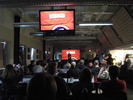
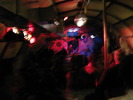
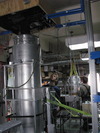
It's Monday afternoon, probably my last full day here. I'm scheduled to leave
on tomorrow's outbound PAX flight (although this morning's passenger flight
boomeranged due to weather conditions here, so we'll see). I've been trying to
get back onto the dayshift to ease the transition.
On Sunday the annual South Pole International Film Festival (SPIFF) was held.
On the program were several short films created by Polies this season (anyone
could enter: there are several video cameras which can be borrowed). All were
very good. After the SPIFF, the end of summer party was held at the bar out in
Summer Camp. Several local bands performed. A good time was had by all.
Sunday night we started beam mapping K2. This morning we've started to
disassemble K1 to fix a problem we found last week. We've also been preparing
to mount the far field flat, a large, flat mirror that gets mounted outside and
allows us to see things close to the horizon. (Station population: 182)
2011-01-28 17:50 UTC
Weather: Condition 3| Temp: | −28°C |
|---|
| Wind: | N @ 15 knots |
|---|
| W'chill: | −42°C
(2230 W/m2) |
|---|
| Pressure: | 68.48 kPa
(10,440') |
|---|
| Vis: | 3200 m |
|---|
| Sky: | Mostly Cloudy |
|---|
| Blowing snow |
|---|
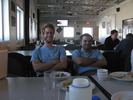
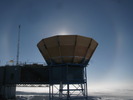
It's Saturday morning. I'm now firmly on night shift, which means I'll be heading for bed right after our daily morning meeting. We've noticed some trouble
with one of our receivers and are trying to decide if we need to open it or not.
We've had high winds for the last few days, and windchills of -40 (˚C or ˚F,
take your pick). Winter is approaching. Zak and I are the nightshift crew;
we've both taken to biking out to MAPO to work, but there being only one bike
means we can't both do it at the same time. (Station population: 182)
2011-01-26 14:50 UTC
Weather: Condition 3| Temp: | −27°C |
|---|
| Wind: | NE @ 12 knots |
|---|
| W'chill: | −39°C
(2090 W/m2) |
|---|
| Pressure: | 68.97 kPa
(10,260') |
|---|
| Vis: | 4800 m |
|---|
| Sky: | Mostly Clear |
|---|
| Blowing snow |
|---|
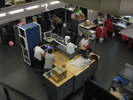
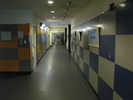
It's late Wednesday evening, or early Thursday morning, depending on your
perspective. My schedule has been sliding later and later, and now I might
actually be working nights. It's hard to tell. With all three cryostats now
closed up and cold or cooling down, the focus has shifted somewhat from assembly
to characterisation. I've been spending more time in the Science lab in the
Elevated Station than previously. In the evenings and over night we have been
taking beam maps, for which Zak has been working nights. We can't do it while
people are working in MAPO because the floor is too springy. This evening
(Wednesday), Justus, Phil, Jon and I hosted Pub Trivia night. (Our "reward" for
winning last week.)
Every day the three satellites which we use to communicate with the outside
world (both Internet and telephone) shift their schedules earlier by about four
minutes. This works out to about half an hour a week. When I first arrived,
the GOES-3 satellite was rising around 3:15 AM, and set around 9:50 AM. Today
it rose at 2:02 AM and will set again 8:37 AM, which is why I can upload this
post now. (The other two satellites, TDRS-5 and TDRS-6 are up from about 11 AM
until 3:30 PM, which is why most of my posts usually happen around noon.) The
problem with this is that our normal weekly telecon, scheduled for 9:00 AM now
does not happen during the satellite pass. We can get around this by using the
Iridium satellite network to call out, but the quality has been poor as of late.
As a result, we've moved the telecon up to 6 AM. Which partially explains why
I'm still up. (Station population: 196)
2011-01-24 01:17 UTC
Weather: Condition 3| Temp: | −25°C |
|---|
| Wind: | N @ 9 knots |
|---|
| W'chill: | −35°C
(1900 W/m2) |
|---|
| Pressure: | 68.51 kPa
(10,430') |
|---|
| Vis: | 1200 m |
|---|
| Sky: | Overcast |
|---|
| Light snow grains |
|---|
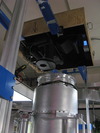
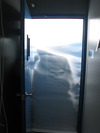
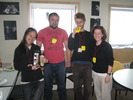
It's Monday noon. We've closed up the final cryostat (K2) and are preparing to
cool it down. We have also been beam-mapping K1 and are thinking about putting
it up on the mount.
Saturday evening I attended James Brown Bingo. (This James Brown is our head cook, not the James Brown you're familiar with). I didn't win. On Sunday was
the First Polympiad. There were five events:
- a triathlon (bike, ski, run)
- a race up the stairs in the Beer Can. (The Beer Can is the cylindrical metal
structure which connects the Elevated Station to the Underground Station. You
can see it here behind me.)
- a cycling distance race across the sastrugi. ("Sastrugi" is a fancy word
for ungroomed snow.)
- a sled pull to see who could pull the most weight.
- a race to see who could get into their ECW gear the fastest.
The keck team fielded participants in all events except for the ECW gear race.
I competed in the sastrugi cycling race (I didn't do very well, but had fun),
and then watched the sled pull and the ECW race. In the sled pull, we ran out
of weights (fifteen lead-acid batteries, about 975 pounds / 440 kg total), so
we had to start putting spectators on the sled. First was Chin-Lin (who also
had competed), but she wasn't enough, so I went next, and managed to provide
enough weight to separate the winner from second place. As a group, we won
four gold, a silver, and a bronze, which probably puts us at the top of the
medal standings. (Station population: 205)
2011-01-22 00:50 UTC
Weather: Condition 3| Temp: | −22°C |
|---|
| Wind: | NNE @ 10 knots |
|---|
| W'chill: | −32°C
(1850 W/m2) |
|---|
| Pressure: | 68.61 kPa
(10,400') |
|---|
| Vis: | 4800 m |
|---|
| Sky: | Overcast |
|---|
Light snow grains
Mist |
|---|
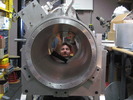
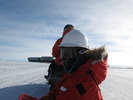
It's Saturday, noon. John, Robert, and Steve left Wednesday afternoon.
Wednesday night was Pub Trivia Night hosted by the SPT guys. Our combined
Keck/BICEP2 team won, which gave us some beer and some dubiously useful gift
certificates to a grocery store in Christchurch. It also left us on the hook
for arranging next week's Pub Trivia night.
On the work front, K1 characterisation has been going on, and K2 is being
closed up. I worked until 6 am on Tuesday night and/or Friday morning working
out some bugs in the MCE firmware programming tools, and have mostly spent time
trying to deal with bugs in various software. As you can see at right, it's
quite warm today, but whiteout conditions persist, preventing us from
characterising our noise on the sky. (Station population: 211)
2011-01-18 21:50 UTC
Weather: Condition 3| Temp: | −28°C |
|---|
| Wind: | NE @ 8 knots |
|---|
| W'chill: | −38°C
(1950 W/m2) |
|---|
| Pressure: | 69.93 kPa
(9900') |
|---|
| Vis: | Unrestricted |
|---|
| Sky: | Mostly Clear |
|---|
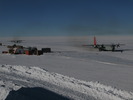
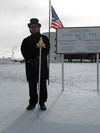
It's almost noon on Wednesday. Monday and Tuesday have gone on without
incident. K1 continues to cool down, which is good news. The cryostat assembly
team has started working on K2, the final cryostat. I spent some time the last
few days checking out the final MCE crate which Martin carried down, and have
also worked a bit on upgrading the observing schedule code which we got from
BICEP2 to account for differences between BICEP2 and Keck.
Steve and John are leaving today, and Robert is heading to Christchurch for
his R&R before he starts his winter-over. On Monday Steve and I visited
the two Poles (the Geographic Pole and the Ceremonial Pole) for obligatory
pictures. Last night, in honour of Steve's departure, we did the sauna followed
by a dash to the Pole thing. Yesterday was laundry day for me, and this
morning I dipped into my ration of shower time, so I'm unusually clean at the moment. (Station population: 206)
2011-01-16 19:50 UTC
Weather: Condition 3| Temp: | −27°C |
|---|
| Wind: | ESE @ 7 knots |
|---|
| W'chill: | −36°C
(1860 W/m2) |
|---|
| Pressure: | 69.99 kPa
(9880') |
|---|
| Vis: | Unrestricted |
|---|
| Sky: | Mostly Clear |
|---|
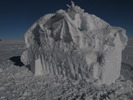
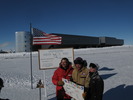
It's Monday noon. The big event on Sunday was the South Pole Contingency
Marathon, the first marathon ever run at the pole. A few of the Station
Residents were planning to race in the McMurdo Marathon this weekend.
Unfortunately, weather in McMurdo prevented them from flying out. So, instead
they planned a marathon here at Pole. There were four runners in the marathon;
the winning time was four hours, two minutes, fifteen seconds. The route
consisted of a Race Around the World (a track run on New Years, about 3.4
kilometres long), then ten lengths of the ski-way (five times back and forth;
the bulk of the race), and finally from there to the Geographic South Pole.
Other people ran a half marathon. One of these was our own Sarah, who kept on
running and did almost the whole marathon, forgoing only the last lap of the
ski-way. I contented myself with watching, and cheering, and taking pictures.
I did try running the last little bit, from the end of the ski-way to the finish
line (about 750 meters), and figured that was enough for me. Except for a bit
of a wind it was sunny and not a bad day for the race.
Sunday was also the judging day for the snow sculptures which people had
been working on for the past few weeks. I had an opportunity to check them
out and take some pictures while waiting at the finish line for the marathon
runners.
While all this was going we also spent some time in the Science lab in the
Elevated Station working on responsivity data. After dinner Clem gave a talk
about Keck. Late in the evening, because the weather was still clear, we got
the okay from Justus to try taking simultaneous measurements with Keck and
BICEP2 to try to get a better handle on our sensitivity. We started the
schedule about 3:30 in the morning and it ran until the first people showed up
in the morning, which was good timing. A second similar tandem test is now in
progress. Just now, our last Keck team member, Martin, arrived with our final
set of detectors. (Station population: 203)
2011-01-15 23:50 UTC
Weather: Condition 3| Temp: | −28°C |
|---|
| Wind: | SSE @ 10 knots |
|---|
| W'chill: | −39°C
(2050 W/m2) |
|---|
| Pressure: | 69.73 kPa
(9980') |
|---|
| Vis: | Unrestricted |
|---|
| Sky: | Mostly Clear |
|---|
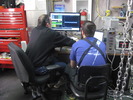
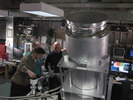
Howdy. It's Sunday afternoon. We're staying in station today, running the
telescope remotely. Yesterday we checked out the K1 cryostat we closed up the
previous evening. Happily, we found no reason to open it up again, so
eventually we attached the pulse tubes to it to start cooling it down. I spent
some time debugging some tuning algorithms. In the evening we tried to take
some noise data, but were unable to, so were doing it again, now.
(Station population: 202)
2011-01-14 17:50 UTC
Weather: Condition 3| Temp: | −23°C |
|---|
| Wind: | E @ 7 knots |
|---|
| W'chill: | −31°C
(1730 W/m2) |
|---|
| Pressure: | 69.48 kPa
(10,070') |
|---|
| Vis: | 6000 m |
|---|
| Sky: | Overcast |
|---|
Light snow grains
Mist |
|---|
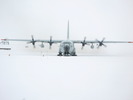
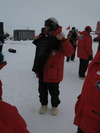
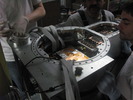
It's Saturday noon. Yesterday was filled with the closeout of the K1 cryostat
(our second of three). We (largely not including me) managed to get it onto the
pump by 2:30 last night. In the evening, we also ran a test schedule (a
scripted list of tasks for the telescope), which went well.
Additionally, Walt, our software guru left yesterday. His flight back to
McMurdo also flew out approximately thirty IceCube people, putting something
of a dent in the local population (Station Population: 202).
2011-01-13 20:31 UTC
Weather: Condition 3| Temp: | −21°C |
|---|
| Wind: | N @ 8 knots |
|---|
| W'chill: | −29°C
(1720 W/m2) |
|---|
| Pressure: | 69.14 kPa
(10,200') |
|---|
| Vis: | 6000 m |
|---|
| Sky: | Overcast |
|---|
| Light snow grains |
|---|
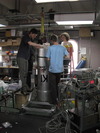
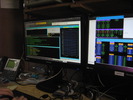
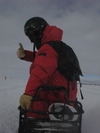
It's noon on Friday. Thursday was a long, but mostly successful day. I spent
a good part of it taking more noise data. During this time, another team was
doing the closeout of the K1 cryostat (our second receiver). Late in the
evening, we got things together sufficiently to run our first observing
schedule, although this was a instrument characterisation schedule and not a
science one, and it was overcast, so we couldn't see anything. Nevertheless, a
good test of the system. We got back to Station around 3am.
(Station Population: 230)
2011-01-12 18:50 UTC
Weather: Condition 3| Temp: | −22°C |
|---|
| Wind: | E @ 11 knots |
|---|
| W'chill: | −32°C
(1880 W/m2) |
|---|
| Pressure: | 68.91 kPa
(10,280') |
|---|
| Vis: | Unrestricted |
|---|
| Sky: | Mostly Cloudy |
|---|
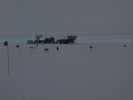
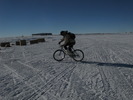
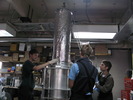
It's Thursday morning. Progress has been occurring. The big thing for the past
couple of days has been the assembly of our second receiver, the K1 cryostat.
In parallel to this, we have been trying to take noise data and get the BLASTbus
working.
On Tuesday, Jon arrived from McMurdo, where he had been stuck for a week due
to a burst blood vessel in his ear drum. Yesterday, Clem arrived. Yesterday
evening I attended a very interesting lecture about the South Pole Greenhouse.
After that, it was back to MAPO to try to do run a noise schedule.
(Station Population: 230)
2011-01-10 17:50 UTC
Weather: Condition 3| Temp: | −23°C |
|---|
| Wind: | WNW @ 8 knots |
|---|
| W'chill: | −32°C
(1790 W/m2) |
|---|
| Pressure: | 69.32 kPa
(10,130') |
|---|
| Vis: | Unrestricted |
|---|
| Sky: | Overcast |
|---|
| Light snow grains |
|---|
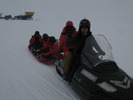
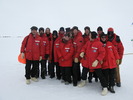
Monday was back to normal. I spent most of my day looking at noise data, and
chasing a few MCE related software bugs. The big event was the arrival of
Darren and Steve, and the departure of Chao-Lin. We went out to greet the new
arrivals and send Chao-Lin off just before lunch.
(Station Population: 236)
2011-01-09 15:50 UTC
Weather: Condition 3| Temp: | −26°C |
|---|
| Wind: | E @ 9 knots |
|---|
| W'chill: | −36°C
(1930 W/m2) |
|---|
| Pressure: | 68.86 kPa
(10,300') |
|---|
| Vis: | Unrestricted |
|---|
| Sky: | Partly Cloudy |
|---|
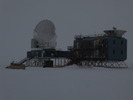
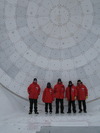
It's Monday morning. Sunday was more-or-less a day off. There's no breakfast
on Sunday, but there is brunch from 10 till 1. I showed up for brunch around
noon after having a nice restful morning and then visited the Station Store for
a bit. In the afternoon Zak, who wintered over with the South Pole Telescope
(SPT) in 2007, took us out to see it. The SPT team were doing work on the
receiver, so they had "docked" the telescope (ie. pointed it down, mating it to
the roof of the building) which allowed them access to the receiver cabinet and
enabled us to go up to the telescope itself and take some pictures. In the
evening there was a sience lecture about ARA, an ambitious cosmic ray telescope
proposed for Pole.
(Station Population: 220)
2011-01-07 23:50 UTC
Weather: Condition 3| Temp: | −25°C |
|---|
| Wind: | NE @ 9 knots |
|---|
| W'chill: | −35°C
(1900 W/m2) |
|---|
| Pressure: | 68.76 kPa
(10,340') |
|---|
| Vis: | Unrestricted |
|---|
| Sky: | Mostly Cloudy |
|---|
| Ice crystals |
|---|
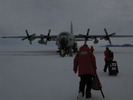
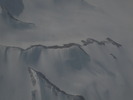
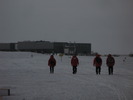
It's Saturday evening. I've been at the South Pole for a few days.
On the morning of the 2nd, as we were preparing to head back to Christchurch we
learned that our flight scheduled for that evening had been postponed again for
another 24 hours. Nevertheless, we decided to head back to Christchurch
anyways, so we could run some errands. We got back in the afternoon, and
happened across Colin, another of our group, who had gotten stuck in Boston due
to weather, but had managed to catch up with us anyways.
Monday morning was spent doing our errands, and in the evening we headed for the
airport to prepare for our flight. The weather was warm (~30C), which didn't
make putting on our cold weather gear in preparation for the flight very
pleasant. We boarded the C-17 on time and taxied out to the runway. The plane
was quite full, having to take all the people who had accumulated due to the
cancelled flights. The flight crew aborted our first launch attempt, which
didn't inspire much confidence, but the second try was a go and we headed off
to Antarctica.
The flight was fairly unpleasant; we all tried to sleep with little success. We
landed at Pegasus Field outside McMurdo some time after four in the morning, and
boarded the familiar Ivan the Terrabus for the long trip into McMurdo. In town
we were given the standard debriefing and then were just in time for breakfast
in the galley. After breakfast I located my room for the night, a dorm in
Building 155 (the main building in town) and slept for a few hours. I woke up
about an hour before lunch and wandered around a bit. If you're in transit,
there's not much to do in McMurdo. Jon got a bit of bad news here; he had been
having a bit of a cold, and during the flight to McMurdo had burst some blood
vessels in his ear. Being unable to fly, he was going to be stuck in McMurdo
for a week or two until it healed.
After lunch I met Laura, one of the BLASTPol grad students, which resulted in
me heading over to the Crary Lab where they were set up for the BLASTPol flight
which was going on. I had a pleasant afternoon catching up with the BLASTPol
team. After dinner we had bag drag (where they palletise all our luggage
(except carry-on) and weigh everything in preparation for our southbound flight
tomorrow morning.
When I got up Wednesday morning, I learned the flight had been delayed by
an hour, but was still a go. We left McMurdo around 8:45 for Pegasus where
we boarded an LC-130 Hercules for the three hour flight to Pole. There were
fourteen of us on the flight, which was otherwise basically empty, save for our
gear and a few things for Keck which had been delayed in Christchurch for the
same reason as we had been.
Unlike the C-17 flight, this one went fairly pleasantly. There was a lot
of room to move around in and we managed to get some nice views of the
Transantarctic Mountains. We landed at the South Pole just after lunch. When
we deplaned, we were greeted by a large contingent of the Station's residents,
including the other members of the Keck team. After a short briefing and room
assignments, we went to the galley for leftovers and a brief chat with the Keck
team.
South Pole Station is 2836 meters (9305 feet) above sea level, but due to the
rotation of the Earth, the pressure is even lower, resulting in a "physiological
altitude" of roughly 3100 meters (10,300 feet). Accordingly, I spent most of
Wednesday acclimatising to the altitude, and wandering around the Station.
In the evening there was a planting party in the Station greenhouse, where they
grow vegetables for consumption during the winter.
Thursday was my first day of work here at Pole. I headed out to MAPO (the
Martin A. Pomerantz Observatory) where Keck is being built up on an existing
mount, which was originally used for a telescope called DASI. I spent most of
the day working with Sarah, trying to get the control computer talk to one of
the MCE crates which had been mounted on the telescope. I spent a good part
of the afternoon modifying the MCE power supply to allow it to power the MCE
cooling fans. In the evening it was trivia night, but I skipped it, instead
heading back to MAPO with Zak to complete the modifications to the power supply
and do some tests with the detectors. The last of our three cryostats,
designated K2, arrived.
Friday was more of the same. The work on the power supply the previous
day had led me to discover the MCE also needed some modifications. We took
the MCE down and I made the necessary modifications. After it went back up,
we started looking at the noise of the telescope. Saturday was filled with
more noise testing. On Saturday evening the meteorology department (ie. the
weather guys) had a wine and cheese, which was a pleasant way to end the week.
(Station Population: 216)
Tue 2011-01-04 02:42:57 UTC
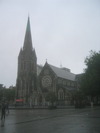
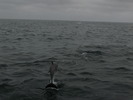
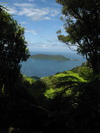
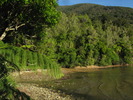
Okay, okay. I wasn't planning to make a journal for this trip, but I've already
filled up an SD card, and I need to do something with them, so here we go.
I got to Christchurch on the 27th of December (which meant I left on the 25th).
I was supposed to fly to McMurdo on the 30th of December, and then South Pole
the following day. It's now the 1st of January; I'm still in New Zealand.
The next southbound flight is scheduled for the 2nd (in the evening, which is
unusual).
Monday the 27th was mostly spent recovering from the 28 hour Vancouver to
Christchurch endeavour. Tuesday was a free day for me. Also quite wet: it
rained for most of the morning and afternoon. The day before I arrived (Boxing
Day) there had been a magnitude 4.9 earthquake (an aftershock of the September
quake) centred directly under the city. Many buildings in the city centre
were damaged (mostly minor), and the whole place was in upheaval, with building
inspectors running to and fro, and things being cordoned off, de-cordoned, or
re-cordoned. I wandered around town in the rain and ran a few errands.
In the evening, after the rain stopped, I ended up at a pub near the hotel
(the Bard on Avon, if we're keeping score) for dinner and a pint, and happened
across Zak, Grant, and Jon, three members of the Keck/BICEP2 team who are
heading down with me.
Wednesday the 29th was clothing issue day. I random-walked over to the
botanical garden in the morning. In the afternoon we headed off to the CDC
(Clothing Distribution Centre) to get our ECW (Extreme Cold Weather) gear, which
went off without a hitch. In the evening we discovered our flight, which had
been scheduled for a 4am check-in on Thursday had been delayed 24 hours until
the 30th.
After a late night on the 29th, the 30th was a slow day. We thought about going
to the New Zealand vs. Pakistan cricket match which was being played in
Christchurch that day, but in the end decided to skip it. The evening of the
30th brought us the news that our flight on the 31st had been cancelled as well,
so now we were scheduled to depart on the evening of the 2nd of January (since
the USAF doesn't schedule flights over New Years). With a few unexpected days
off, we decided to rent a car and head north the following morning.
We headed out Friday morning (New Year's Eve). Our first stop was Kaikoura,
a couple of hours up the coast. Here we had a rather unpleasant lunch, and then
took a boat out for some whale and dolphin watching. We found one sleeping
sperm whale and about a billion dolphins. Very cool.
Having exhausted Kaikoura, we decided to continue further north to Picton, the
southern terminus for the ferry from Wellington. We got in just before New
Years, and after checking into a hotel, headed down to the docks to take in the
fireworks. The next morning we hired a boat to take us out to the head of the
Queen Charlotte Track, a very picturesque, multi-day hike among the Marlborough
Sounds. We mapped out a day hike from the trail head (Ship Cove) to one of
the resorts in the area (Furneaux Lodge), a distance of approximately 15 km
through dense rainforest. One random encounter involving a cow occurred.
We were picked up from Furneaux Lodge by our boat in the evening and had a
relaxing dinner after a good hike.
© 2011 D. V. Wiebe.
Generated Fri 2025-07-18 22:50:12 UTC





































































